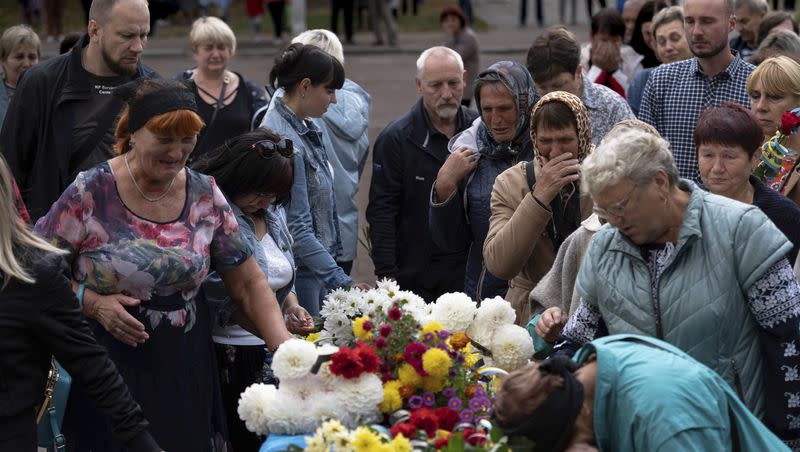Poll shows Utah interest in Ukraine still high, but urge to help waning

- Oops!Something went wrong.Please try again later.
- Oops!Something went wrong.Please try again later.
Now that the U.S. House has a speaker, discussions about the Biden administration’s proposed $106 billion national security package, including aid for Israel and Ukraine, have picked up.
President Joe Biden met with new Speaker Mike Johnson and Democratic leader Hakeem Jeffries on Thursday to talk about the proposal. A staunch conservative, Johnson, R-La., has shown little interest in Congress providing more money to Ukraine in its war with Russia, The Associated Press reported.
Instead, Johnson said House Republicans would first bring a separate bill to provide $14.5 billion in aid to Israel, but they need more information about the Biden administration’s Ukraine strategy.
“We can’t allow Vladimir Putin to prevail in Ukraine because I don’t believe it would stop there,” Johnson said in an interview on Fox News’ “Hannity” the day after he was sworn in. “And it would probably encourage and empower China to perhaps make a move on Taiwan. We have these concerns. We’re not going to abandon them.”
A new Deseret News/Hinckley Institute of Politics poll shows Utahns’ interest in the Russia-Ukraine war is waning, but still high nearly two years into the conflict. The survey found 61% of respondents are very closely or somewhat closely following the war, down considerably from the 85% a month after Russia’s unprovoked attack on Ukraine in February 2022.

Utahns remain divided about whether the U.S. is doing enough to respond to the ongoing war and what that response should look like.
More than half now, 55%, say the U.S. is doing enough, while 25% say it is not. One-fifth say they don’t know. In March 2022, a Deseret News/Hinckley Institute poll found 42% believed the U.S. was doing enough and 41% did not.

Related
Utahns’ thoughts on the types of responses have shifted as well since the early days of the war.
Providing humanitarian assistance and weapons are still the most popular responses in the new poll: 61% say the U.S. should send humanitarian aid to Ukraine and 40% military support. But those numbers are much lower than they were 20 months ago at 73% and 68%, respectively.
The survey also shows only 36% now favor more economic sanctions, 29% support seizing and freezing assets of private Russian citizens, 28% want financial assistance to support the military response and 19% favor sending troop support to assist in combat.
Calls for those actions were all higher in March 2022. And while 6% of poll respondents back then said the U.S. should not do any of those things, that number is up to 20% in the latest survey.
The poll found that a higher percentage of Democrats than Republicans favored each of those possible U.S. responses to the Russia-Ukraine war. Also, only 33% of Democrats say the U.S. is doing enough to help Ukraine, compared to 61% of Republicans.

Related
Hard-line conservatives in Congress fought any additional financial aid to Ukraine.
Former House Speaker Kevin McCarthy removed Ukraine funding from a late-September funding bill under pressure from conservatives opposed to the aid and who had threatened to oust him if he gave in to Biden administration demands, per CBS News.
Some of those Republicans now say they could accept holding separate votes on Ukraine money, which they oppose, and aid to Israel, which they favor.
Johnson told Fox that he wants “accountability” over how the money is spent as lawmakers “have a stewardship responsibility over the precious treasure of the American people.”
Related
Since the war began, the Biden administration and Congress have directed more than $75 billion in assistance to Ukraine, which includes humanitarian, financial and military support, according to the Kiel Institute for the World Economy, a German research institute.
On Thursday, the administration announced it’s sending another $150 million in security assistance to Ukraine, including air defense capabilities, artillery ammunition, anti-tank weapons and other equipment, according to the Defense Department. It is Biden’s 49th tranche of equipment for Ukraine since August 2021.
Biden's national security package unveiled last week includes $61.4 billion in military, economic, infrastructure and resettlement aid for Ukraine. It would also get a share of the $10 billion in humanitarian assistance that includes Israel and Gaza.
White House National Security Council spokesman John Kirby told reporters Thursday that Russian President Vladimir Putin is not giving up on his aspirations to take all of Ukraine. He said it’s critical that Congress pass Biden’s funding request.
“It’s time now to move forward with that supplemental funding, because time clearly is not on our side or on — or on that of Ukraine going forward,” Kirby said.
A group of Republican senators, including Utah Sen. Mike Lee, introduced a bill Thursday that would decouple funding for Israel from billions of additional dollars the White House requested for Ukraine.
Lee said in a press release that Ukraine and Israel are distinct issues and Congress should have the opportunity to consider and vote on prospective aid packages individually.
“If the Biden administration’s case for additional Ukraine aid is not strong enough to stand on its own, then packaging them is an insulting request to lay before Congress,” he said. “It is unreasonable for the administration to exploit an aid package for Israel to siphon off billions of taxpayer dollars in yet another blank check for Ukraine.”

